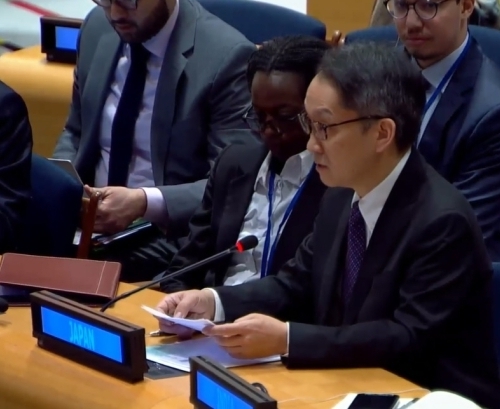Statement by H.E. Ambassador MIKANAGI Tomohiro, Deputy Permanent Representative and Chargé d'affaires ad interim of Japan to the United Nations, at the PBC Ambassadorial-level formal meeting on the Annual Report and Election of Officers
2025/1/30

(As delivered)
I would like to express my sincere gratitude to Brazil for its leadership as Chair, and to Croatia and Kenya for their contributions as Vice-Chairs, as well as to the Chairs of the Country Configurations for their work over the past year.
It is a great honor and privilege for Japan to serve as one of the Vice Chairs of the PBC for this important year of the Peacebuilding Architecture Review (PBAR). Japan looks forward to working closely with Germany, the new Chair, Brazil, Poland and Morocco, fellow Vice-chairs. Ambassador Leendertse and her team’s extensive experience and knowledge in peacebuilding assure us that we are in excellent hands.
Taking this opportunity, please allow me to highlight three key points that Japan deems essential for maximizing the role of the PBC. They are in line with the recommendations made by the Secretary General in his latest report.
First, the PBC should make efforts to expand its geographic and thematic scope further while upholding the principle of national ownership. The PBC has a great potential for countries to share good practices, highlight their priorities, and seek substantive support and adequate resources. To realize this potential, it is important to make efforts in communicating with potential users explaining the utility of the PBC. In this regard, Pacific Island countries have engaged in countering the impact of climate change, while Timor-Leste has shared its best practices in peacebuilding through institution building, both under the commendable leadership of the then PBC chair, Bangladesh. These are result of communication efforts made by the members of PBC PBC. We should continue these efforts, and it is also important to follow-up on these meetings.
Second, we should continue to seek synergies among all available resources, including resources of international financial institutions (IFIs), regional development banks, UN agencies, funds and programmes. The PBC, mandated to marshal resources, should help facilitate greater engagement among these potential contributors.
Third, we should all continue our efforts to optimize collaboration among the PBC, the Security Council, and other UN organs. Japan strongly believes such collaboration can realize an efficient and effective comprehensive approach toward sustaining peace, by leveraging and utilizing the unique characteristics of each body. Last year, Japan, as chair of the IWG of the Security Council, oversaw the revision of “Note 507”, which includes reaffirmation of the importance of strengthening collaboration with the PBC and emphasized the need for strategic, timely, and targeted PBC advice. I believe that the quality of PBC advice to the Security Council can be further refined by incorporating lessons learned from the activities of the PBC and the PBF.
Finally, progress has been made in these three areas in the past five years. This progress must be systematized, institutionalized, and advocated both within the PBC and across related fora. This year’s PBAR offers another opportunity to mark and advance progress in this regard.
In closing, I would like to reiterate that Japan is committed to working closely with all of you to further strengthen the PBC as a critical tool of the United Nations for sustaining peace.
I thank you, Madam Chair.
